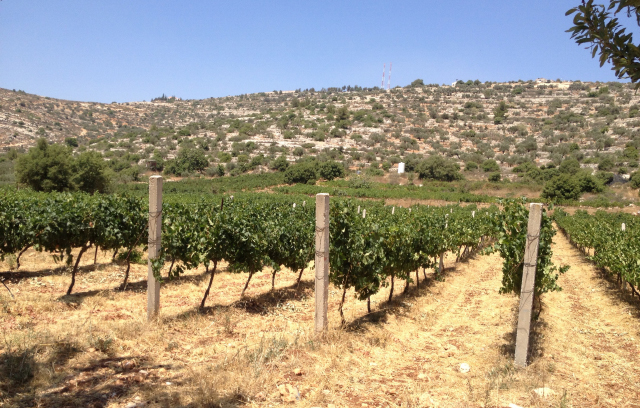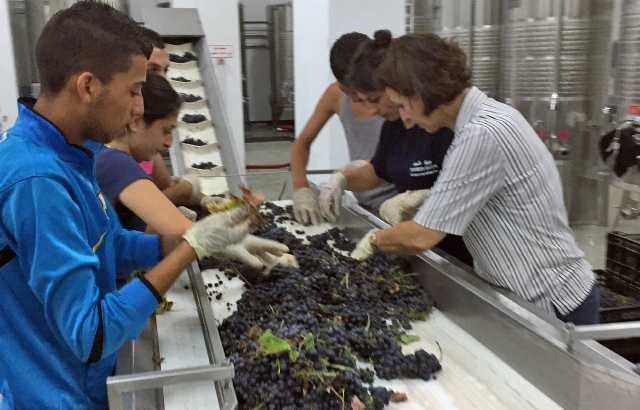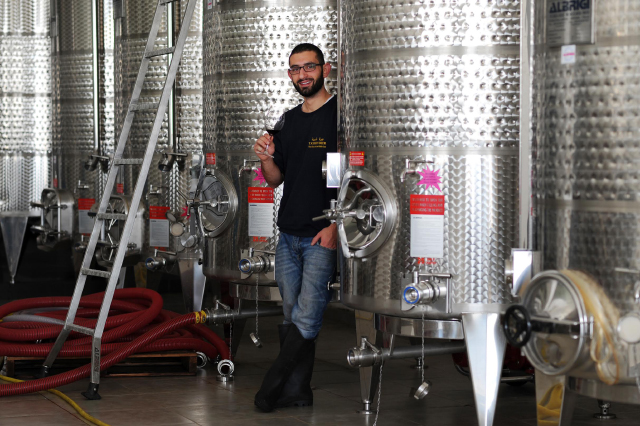West Bank’s first boutique winemaker plants a successful enterprise
When the first bottles of Canaan Khoury’s Palestinian wine arrive in U.S. stores later this year, it will mark a full-circle journey for both the Khoury family and their new business.
Khoury, S.B. ’13, a mechanical engineering concentrator, is general manager and winemaker at Taybeh Winery, which his family opened nearly four years ago in a rural West Bank village. The winery grew out of Taybeh Brewing Company, the first microbrewery in the Middle East, which was founded 20 years ago by Khoury’s father, Nadim.
The business traces its roots to Boston; Nadim began brewing beer while he was attending Hellenic College in Brookline in the 1980s. In 1994, after the Oslo Accords, Nadim moved his family to Taybeh village, located less than 10 miles from Jerusalem. Khoury grew up in the midst of the buzzing brewery atmosphere, but it was winemaking that resonated with him.
“It is a tradition in Palestine. A lot of Christian families make wine at home,” he said. “My grandmother was the one who first taught me how to make wine and I began making it myself when I was in high school.”

The vineyards at Taybeh. (Photo provided by Canaan Khoury.)
After enrolling in Harvard, he decided to pursue a mechanical engineering concentration at the John A. Paulson School of Engineering and Applied Sciences, since much of the coursework, such as thermodynamics and fluid mechanics, can be applied to the winemaking process. Shortly after graduation, he took the reins at the newly opened winery.
“Politically speaking, it has been quite tough to get the winery up and running. Since we still don’t have our own Palestinian state, it is not easy to run a business in this part of the world,” he said.
More than 80 percent of the West Bank’s 2 million people practice Islam, which prohibits drinking alcohol, so the local market is limited, he explained. Since nearby Israeli settlements receive priority access to the water supply, the winery only has water once a week. They must pay extra on imports and exports, and shipments of raw materials are often delayed due to security checkpoints, said Khoury.
But he and his family pressed on. They installed reservoirs around the winery and on the roof of the building to store water. And though additional tariffs cause their products to be more expensive, demand in cities like Jerusalem and Jericho has grown as customers seek higher quality, local wine.
Khoury, a graduate of the master brewers program at the University of California at Davis, uses his scientific training and artistic intuition to blend wines using both international grapes, like Cabernet Sauvignon, and lesser-known local varieties. Farmers have grown grapes in the West Bank for millennia, and grapes are the second most prevalent crop after olives, he said.

Workers process grapes for winemaking at Taybeh Winery. (Photo provided by Canaan Khoury.)
The region’s climate and topography present their own challenges.
“Our winery is located at 3,000 feet above sea level, but if you drive just 15 kilometers to the east, you are standing at the lowest point on Earth,” he said. “The harvest in Jericho is in May, while at Taybeh we harvest in September. With so many different microclimates, we still need a lot of time to experiment with different locations and terriors.”
Experimentation is Khoury’s favorite part of the job. The art involved in winemaking—using one’s senses as an analytical tool to decide on a finished product—fuels his love of viniculture.
As a boutique winemaker, he often finds himself playing jack-of-all-trades. Khoury spends time monitoring the grapes, helping with the harvest, aging and blending the wines, but also building the company’s website and designing box labels. He even planned a solar panel array for the roof.
“The hands-on engineering training I received at SEAS has been invaluable for my day-to-day work,” he said. “At Harvard, I learned how to teach myself new skills, which is something I do everyday.”
The work is constantly challenging, but the potential to have an impact on the community is rewarding, he said. The winery has become an epicenter for tourists, and selling wine in the U.S. will further raise the perception of Palestinian products, Khoury said. He hopes the success of his family’s enterprises will inspire others in the West Bank to launch businesses and build the local economy.
“Our ultimate dream is to be able to raise a glass of Taybeh wine and say ‘cheers’ for a peaceful time in this area,” he said.

Khoury stands among the winery's stainless steel fermentation tanks. (Photo provided by Canaan Khoury.)